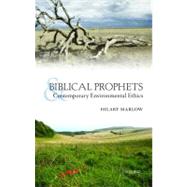- ISBN: 9780199569052 | 0199569053
- Cover: Hardcover
- Copyright: 12/13/2009
In the context of growing concern over climate change and other environmental pressures, Biblical Prophets and Contemporary Environmental Ethics explores what an ecological reading of the biblical text can contribute to contemporary environmental ethics. The Judeo-Christian tradition has beenheld partly to blame for a negative attitude to creation - one that has legitimised the exploitative use of the earth's resources. Hilary Marlow explores some of the thinking in the history of the Christian tradition that has contributed to such a perception, before discussing a number of approachesto reading the Old Testament from an ecological perspective. Through a detailed exegetical study of the texts of the biblical prophets Amos, Hosea and First Isaiah, Marlow examines the portrayal of the relationship between YHWH the God of Israel, humanity and the non-human creation. In the course of this exegesis, searching questions emerge: what are thevarious understandings of the non-human creation that are present in the text? What assumptions are made about YHWH's relationship to the created world and how he acts within it? And what effect do the actions and choices of human beings have on the created world? Following this close textual study, Marlow examines the problem of deriving ethical norms from the biblical text and discusses some key ethical debates in contemporary environmental theory. The book explores the potential contribution of the biblical exegesis to such debates and concludes byproposing an inter-relational model for reading the Old Testament prophets in the light of contemporary environmental ethics.






